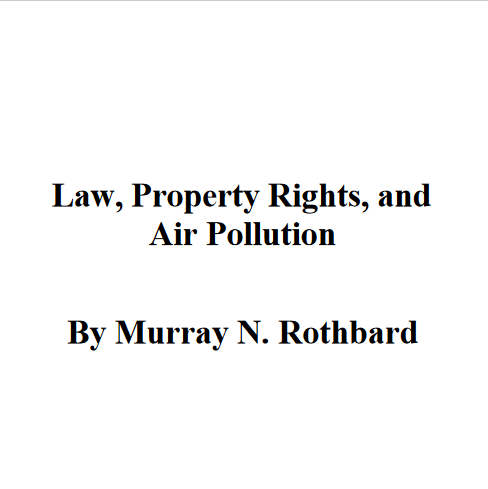Newly released
This book is new and will be uploaded as soon as it becomes available to us and if we secure the necessary publishing rights.

Law, Property Rights, and Air Pollution Book PDF
(0)
Author:
Murray RothbardNumber Of Reads:
75
Language:
English
Category:
Social sciencesSection:
Pages:
51
Quality:
excellent
Views:
985
Quate
Review
Save
Share
Book Description
Law is a set of commands; the principles of tort or criminal law, which we shall be dealing with, are negative commands or prohibitions, on the order of “thou shalt not” do actions X, Y, or Z. In short, certain actions are considered wrong to such a degree that it is considered appropriate to use the sanctions of violence (since law is the social embodiment of violence) to combat, defend against, and punish the transgressors.
There are many actions against which it is not considered appropriate to use violence, individual or organized. Mere lying (that is, where contracts to transfer property titles are not broken), treachery, base ingratitude, being nasty to one’s friends or associates, or not showing up for appointments, are generally considered wrong, but few think of using violence to enjoin or combat them. Other sanctions, such as refusing to see the person or have dealings with him, putting him in Coventry, and so on, may be used by individuals or groups, but using the violence of the law to prohibit such actions is considered excessive and inappropriate.
If ethics is a normative discipline that identifies and classifies certain sets of actions as good or evil, right or wrong, then tort or criminal law is a subset of ethics identifying certain actions as appropriate for using violence against them. The law says that action X should be illegal, and therefore should be combated by the violence of the law. The law is a set of “ought” or normative propositions.
Murray Rothbard
Murray Newton Rothbard was an influential American historian, natural law theorist and economist of the Austrian School who helped define modern libertarianism. Rothbard took the Austrian School's emphasis on spontaneous order and condemnation of central planning to an individualist anarchist conclusion, which he termed "anarcho-capitalism".
Book Currently Unavailable
This book is currently unavailable for publication. We obtained it under a Creative Commons license, but the author or publisher has not granted permission to publish it.
Rate Now
5 Stars
4 Stars
3 Stars
2 Stars
1 Stars
Law, Property Rights, and Air Pollution Quotes
Top Rated
Latest
Quate
Be the first to leave a quote and earn 10 points
instead of 3
Comments
Be the first to leave a comment and earn 5 points
instead of 3